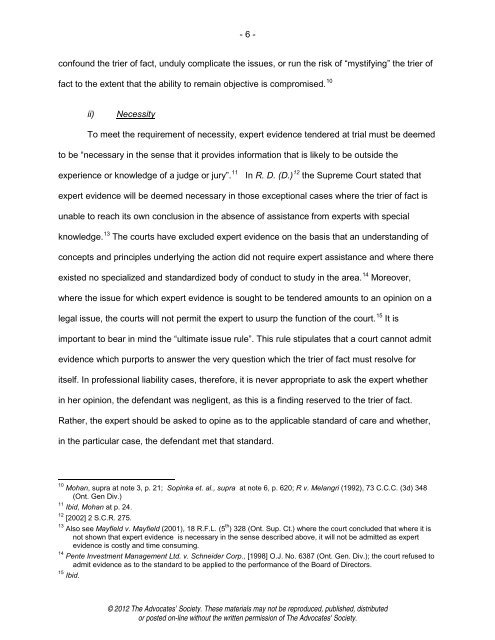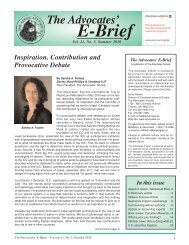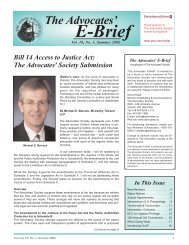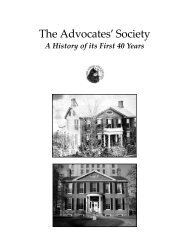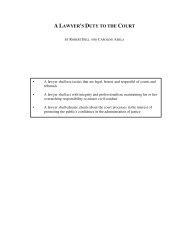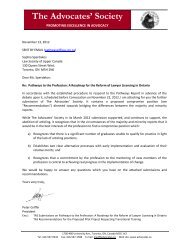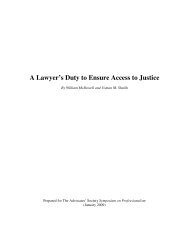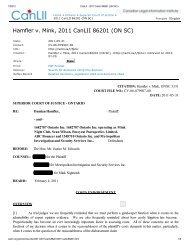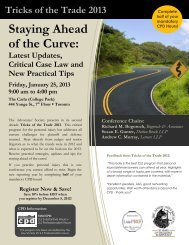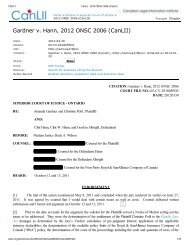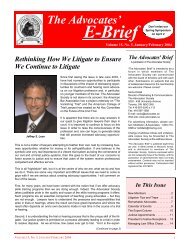Litigation Process a.. - The Advocates' Society
Litigation Process a.. - The Advocates' Society
Litigation Process a.. - The Advocates' Society
You also want an ePaper? Increase the reach of your titles
YUMPU automatically turns print PDFs into web optimized ePapers that Google loves.
- 6 -<br />
confound the trier of fact, unduly complicate the issues, or run the risk of “mystifying” the trier of<br />
fact to the extent that the ability to remain objective is compromised. 10<br />
ii)<br />
Necessity<br />
To meet the requirement of necessity, expert evidence tendered at trial must be deemed<br />
to be “necessary in the sense that it provides information that is likely to be outside the<br />
experience or knowledge of a judge or jury”. 11<br />
In R. D. (D.) 12 the Supreme Court stated that<br />
expert evidence will be deemed necessary in those exceptional cases where the trier of fact is<br />
unable to reach its own conclusion in the absence of assistance from experts with special<br />
knowledge. 13 <strong>The</strong> courts have excluded expert evidence on the basis that an understanding of<br />
concepts and principles underlying the action did not require expert assistance and where there<br />
existed no specialized and standardized body of conduct to study in the area. 14 Moreover,<br />
where the issue for which expert evidence is sought to be tendered amounts to an opinion on a<br />
legal issue, the courts will not permit the expert to usurp the function of the court. 15 It is<br />
important to bear in mind the “ultimate issue rule”. This rule stipulates that a court cannot admit<br />
evidence which purports to answer the very question which the trier of fact must resolve for<br />
itself. In professional liability cases, therefore, it is never appropriate to ask the expert whether<br />
in her opinion, the defendant was negligent, as this is a finding reserved to the trier of fact.<br />
Rather, the expert should be asked to opine as to the applicable standard of care and whether,<br />
in the particular case, the defendant met that standard.<br />
10 Mohan, supra at note 3, p. 21; Sopinka et. al., supra at note 6, p. 620; R v. Melangri (1992), 73 C.C.C. (3d) 348<br />
(Ont. Gen Div.)<br />
11 Ibid, Mohan at p. 24.<br />
12 [2002] 2 S.C.R. 275.<br />
13 Also see Mayfield v. Mayfield (2001), 18 R.F.L. (5 th ) 328 (Ont. Sup. Ct.) where the court concluded that where it is<br />
not shown that expert evidence is necessary in the sense described above, it will not be admitted as expert<br />
evidence is costly and time consuming.<br />
14 Pente Investment Management Ltd. v. Schneider Corp., [1998] O.J. No. 6387 (Ont. Gen. Div.); the court refused to<br />
admit evidence as to the standard to be applied to the performance of the Board of Directors.<br />
15 Ibid.<br />
© 2012 <strong>The</strong> Advocates’ <strong>Society</strong>. <strong>The</strong>se materials may not be reproduced, published, distributed<br />
or posted on-line without the written permission of <strong>The</strong> <strong>Advocates'</strong> <strong>Society</strong>.


